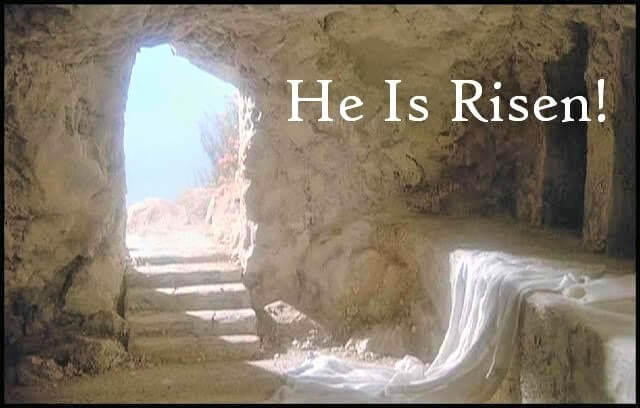 HAPPY EASTER TO FAMILY, FRIENDS AND PARTNERS FROM THE BRIDGE TEAM!
HAPPY EASTER TO FAMILY, FRIENDS AND PARTNERS FROM THE BRIDGE TEAM!
“In this the love of God was manifested toward us, that God has sent His only begotten Son into the world, that we might live through Him. 10 In this is love, not that we loved God, but that He loved us and sent His Son to be the propitiation for our sins. Beloved, if God so loved us, we also ought to love one another.” John 4:9-11
FROM R.K.’S CORNER
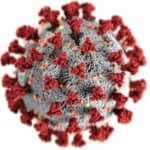
How is it possible that Covid-19, this nano-tiny, attractive-looking ball with heart-shaped spikes, although not being alive, nor possessing a brain or a heart, has the ability to plow through humanity and cause death, distress and disruption in close to 190 countries in less than four months, while shaking the very world system to the core?
This pandemic is making it evident to all that man is not ultimately in charge of his destiny; he must look beyond himself to find purpose and security. Let us pray that the many who are seeking a higher power for answers will, during this Easter Season, experience the fulfillment of the words in Jeremiah 29:12-13, “You will call upon Me and come and pray to Me, and I will listen to you. You will seek Me and find Me when you search for Me with all your heart” … and come to faith in a dynamic relationship with Jesus Christ!
I find it easy to fall into a complaining mode over the inconveniences of being quarantined at home. When I come into that mode, I am reminded of the scores of our brothers and sisters abroad whose life conditions are continually on the brink of disaster, yet they thank God for His love and care and steadfastly share the Good News with others – that makes my seeming hardships non-existent!! Pastor John, one of the Pastors of the Least in the Disciple Ministry Support Bible Institute in the Kibera slum in Nairobi, Kenya, founded by Paul Cowley, is one of them. May his testimony edify you as you and your family celebrate the Risen Lord during this Easter Season!
A DAY IN PASTOR JOHN’S LIFE – by Paul Cowley
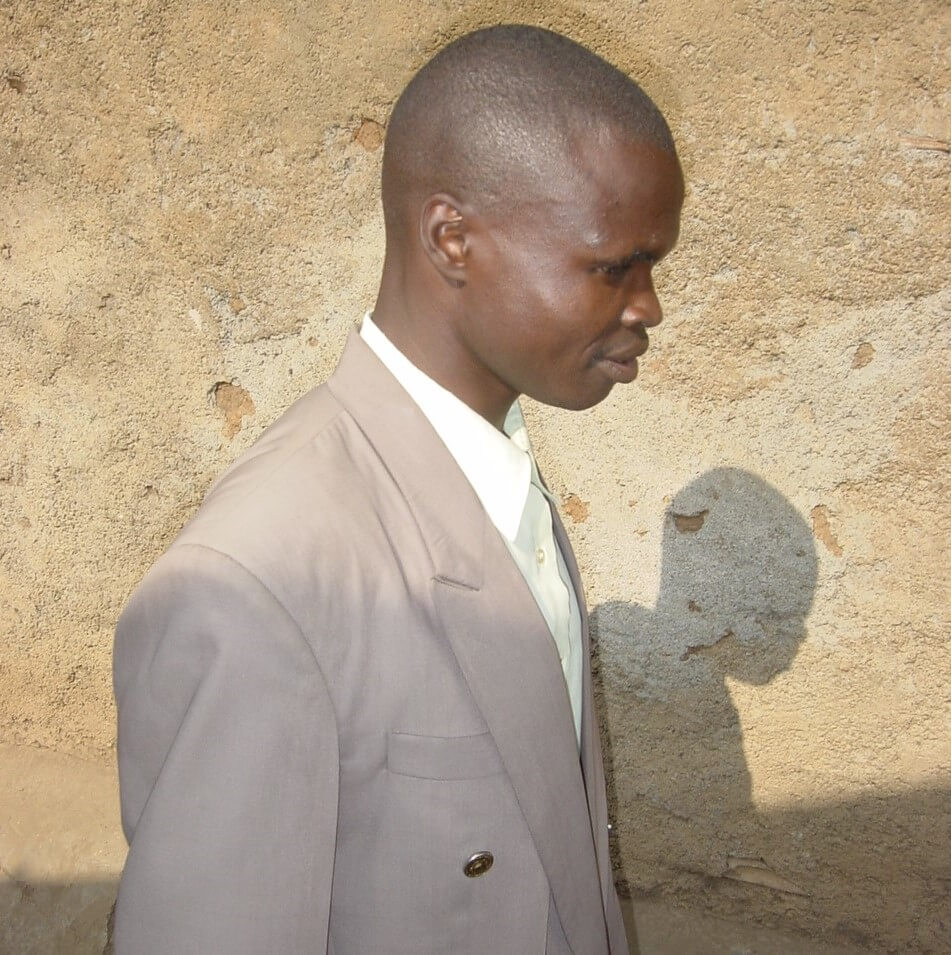
It’s cold and damp this morning. A brisk wind is sweeping through the valley, making the 40-degree temperature seem much colder. With his thin Sunday suit jacket and hard sole shoes, Pastor John sets off for work. It is 3 a.m. The only light guiding him through the dark slum is the moon. It is a one mile journey weaving through the mud, stick and sheet metal shacks, over raw sewage ditches and finally onto the rail line. Shortly he is on the road, joined by hundreds of others beginning the day. Thankful that he has a job to go to, Pastor John shares the Good News with anyone and everyone he happens to be walking next to. He has at least several opportunities each morning. After all, it’s another 2 1/2 hours and 13 miles to work.
Like many of our students, Pastor John works as a security guard. He is fortunate to have the better shift… daytime duty. His official hours of duty are 6 a.m. until 6 p.m. He works 6 days a weeks. No food, no latrine, no water, no breaks are provided. And, ironically, no weapons other than a wood baton. Should any incident occur at the facility he is guarding, he will be arrested, and charged with either complicity with the criminals or criminal neglect. Either charge will result in immediate detention in “remand” waiting for a trial. Most remands continue for at least 60-90 days. His job will be lost even if found not guilty. It has happened to him twice before. To get such a job, every applicant must pay a “consideration” fee to those processing the applications. To keep such a job, every worker must pay a “appreciation gift” to the personnel manager every month. No delay, no complaints, no tattle-tales allowed.
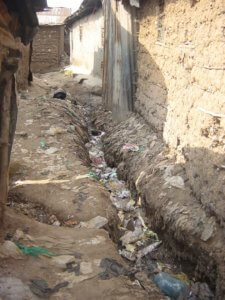
Pastor John’s Path to Work
At 6 p.m., Pastor John begins the walk home. Within a half hour, darkness descends on the city. Another 14-mile journey along busy roads with no shoulder, no lighting and lots of thugs. He prays continually to arrive home safely…and find his family safe as well. It takes longer to get home, due to the countless masses of people walking. Nairobi is called “the Walking City”. There are in excess of 1,000,000 people in the Kibera slum alone, where Pastor John lives. The vast majority of the working poor walk to work because they cannot afford the public transport vans. Transport for John would cost $3 per day round trip. His net pay per day is $2.50. He walks 28 miles per day in order to simply eat.
At 9.30 p.m. he arrives home. His three children are already asleep. He sits down with his wife Janet and thanks God for another day of work, safe travel and provision. Janet uncovers a plate with his one meal for the day: maize and beans. The couple whisper quietly as the children sleep nearby…very nearby. The house is the standard ten by ten foot shack. That space is the living room, dining room, kitchen, bedroom and bathroom…for two adults and three children. It is a combination of mud and stick walls, with sheet metal roofing. The sky is clearly visible through the holes and gaps in the rusted tin. During the two rainy seasons each year, the water literally flows across the floor and pours through the roof. In the dry season, the windowless shack becomes unbearably hot and suffocating.
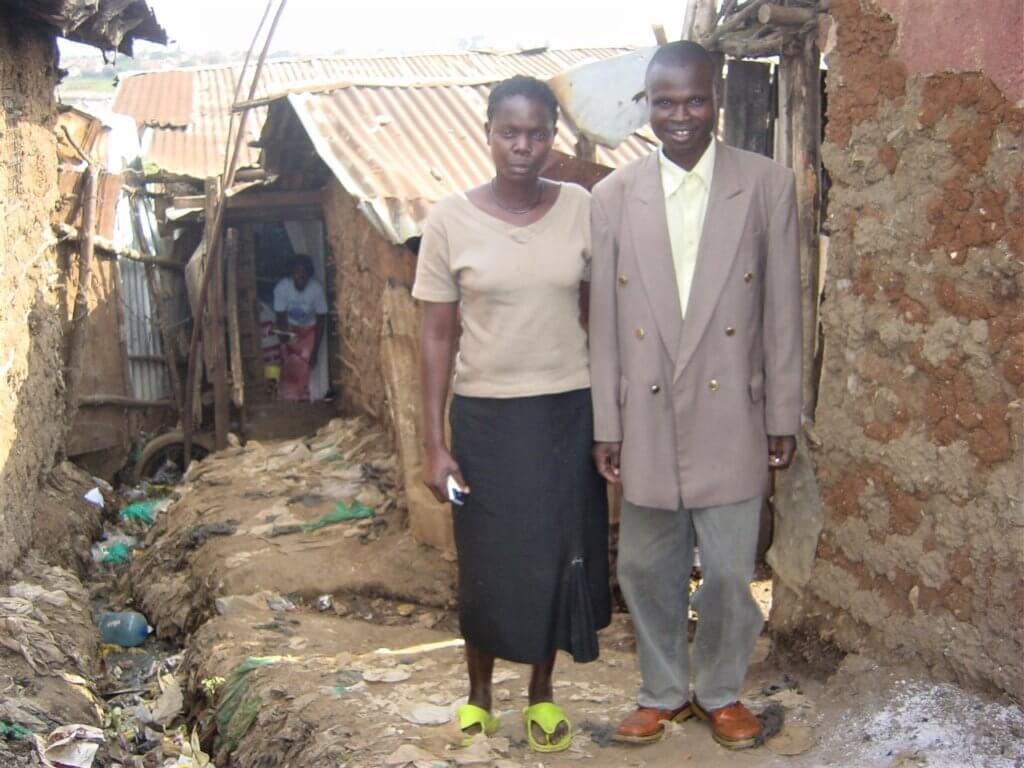
Pastor John and his wife, Janet in front of their shack called Home.
Malaria ridden mosquitoes torment the family throughout the night. These accommodations are in Kibera, one of the most “preferred” slums in Nairobi. There are 199 slums and over 3,000,000 slum dwellers in Nairobi. Most slums are much worse than Kibera. But regardless of where one settles, there is no such thing as “squatting” on land in Nairobi. Everyone pays someone. John will work two full weeks to pay the rent. And that is just the beginning.
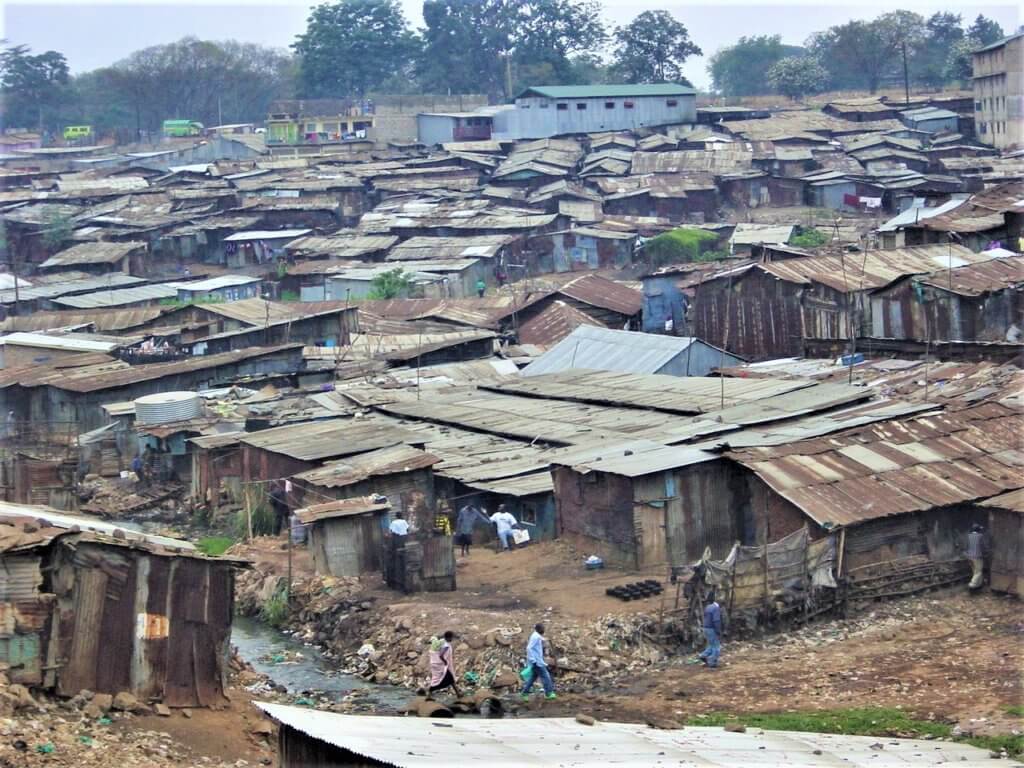
The DMS Bible Institute (white building in the background) towers as a Bright Lighthouse in the Kibera Slum
With the remainder of his pay, John and Janet must overcome a mountain of necessary expenses. They have to purchase and carry their water from a vendor… at nine times the rate the City charges customers with piped water. Then they must purchase wood or charcoal to boil the water. A bucket bath is a luxury. Once per week in the hot, dry season. Much less often in the cold rainy season. To use a pit latrine, they will have to “rent” a key. That is a luxury few slum dwellers can afford. Instead they will use a plastic bag and toss it out the window. They and another 3,000,000 people…every day.
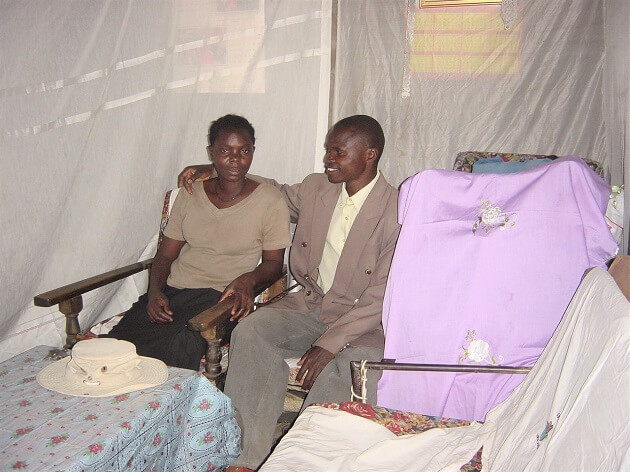
Inside John and Janet’s 10 foot by 10 foot shack called Home
Janet shares with Pastor John the pressing news and needs of the day. She still has severe cramping and bleeding from her recent miscarriage…her third. They would not even examine her at the community hospital. She didn’t have the necessary “gratuity” to even enter the waiting room. And she was in such severe pain, she could not wait the two to three days to be seen. Their eldest daughter was sent home from school for failing to pay the school fees. It takes another 10 days of work to pay the basic tuition for the three children: Maureen is 14 years old in grade 6…the twins, Abel and Milcah are 7 years old in grade one. That does not include exam fees, marking fees, uniform fees, supplies or the development” fees charged by every school. Pastor John instructs Janet to send their daughter back and plead for mercy from the headmaster once again. He then gives her food money to buy some Tylenol.
By 10:30 p.m., dad and mom are asleep in their one bed with their children. Privacy is a luxury they and their children will never know. Never to have their own bedroom, never to use a latrine…nor to use toilet paper or own a toothbrush. Pastor John is one of the fortunate ones…he has a job. At least for today. In just four hours, he will awaken, put on his hard sole shoes and Sunday suit coat… and begin the long walk again… looking for every opportunity to invite people to the church… and to share with them the Good News in his life.
If you want to know more about Paul and Marcia Cowley and their life’s work at the Disciple Support Ministries’ Bible Institute for the Pastor’s of the Least in the Kibera Slum, Nairobi, Kenya, please see a prior update: https://www.bridgeinternational.org/2019/08/
Would you consider becoming a sponsor? Please donate above and mark your donation 8344 Kenya Workers.
